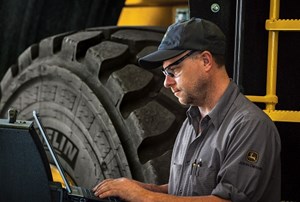John Deere Launches Apprenticeship Program
(UC) — John Deere said it is helping to address the widespread shortage of service technicians, especially in rural areas, through a new Registered Apprenticeship Program it is making available to its dealers.

John Deere has received approval from the U.S. Department of Labor for the new program, which provides dealers with a formalized, on-the-job and technical training plan to help them develop more highly skilled employees.
Through participation in the apprenticeship program, dealers formally commit to developing additional talent in an earn-while-you-learn program. A participating apprentice benefits from structured, on-the-job training in partnership with an experienced mentor. As training progresses, apprentices are rewarded for new skills acquired.
“The new Registered Apprenticeship Program complements our existing John Deere TECH program,” said Grant Suhre, director, region 4 customer and product support for John Deere Ag & Turf. “In addition to the on-the-job training experience, an apprentice will receive technical instruction and be assigned a personal mentor as a part of the highly organized training structure. Upon completion of the apprenticeship, he or she will receive a nationally recognized journeyworker certificate.”
According to Tim Worthington, manager, customer support for the John Deere Construction and Forestry Division, participating dealerships will see numerous benefits.
“Because of the earn-while-you-learn nature of the program, it will help dealers more easily recruit new employees and further develop a highly skilled workforce,” Worthington said. “This can improve a dealer’s productivity and profit potential as employee turnover costs are reduced and employees are retained longer. In addition, John Deere customers benefit from access to more highly skilled dealer personnel who are servicing or supporting their equipment.”
John Deere dealers can collaborate with any number of local organizations as part of the Registered Apprenticeship Program. These organizations include, but are not limited to, the John Deere TECH Program, K-12 schools, community colleges, labor organizations, economic development groups, foundations and workforce development boards.
John Deere dealers who wish to participate can receive support and technical assistance from John Deere and JFF (Jobs For the Future, a US Department of Labor intermediary), who will expedite the registration process with their state or federal apprenticeship agency. After registering, dealers can immediately enter employees into the Agriculture Equipment Technician or Heavy Construction Equipment Mechanic programs. In addition, they can select other occupations for the apprentice program, including sales professionals, parts professionals, accountants or many other occupations and develop appropriate work processes for those jobs. Next, dealers will identify master-level employees who are capable of and willing to mentor apprentices. Finally, dealers will identify potential candidates or incumbent workers who would benefit from the apprenticeship program and enroll them.
When apprentices participate, they track and report their on-the-job learning and technical training time in conjunction with their employer. The dealer’s program administrator then inputs this data into the appropriate state or federal database. To ensure high standards are maintained, dealers are required to follow specific guidelines, developed over years of apprenticeship experience, after they are registered.
To simplify participation for its dealers, John Deere created national guideline standards for the Registered Apprenticeship Program, which have been shared with its dealer channel and is providing technical assistance to dealers interested in participating. “These guidelines provide a consistent apprenticeship program template that any dealer can implement if they participate,” Suhre explained. Dealers can utilize these national guideline standards to have a program approved and operating in a very short timeframe.
Related News
From Archive

- Glenfarne Alaska LNG targets late-2026 construction start for 807-mile pipeline project
- U.S. water reuse boom to fuel $47 billion in infrastructure spending through 2035
- $2.3 billion approved to construct 236-mile Texas-to-Gulf gas pipeline
- Major water pipe break in Puerto Rico hits over 165,000 customers
- Potomac River Tunnel project enters construction phase beneath Washington, D.C.
- Pennsylvania American Water launches interactive map to identify, replace lead water service lines
- Trump's tariffs drive $33 million cost increase for Cincinnati sewer project
- Utah city launches historic $70 million tunnel project using box jacking under active rail line
- Tulsa residents warned after sewer lines damaged by boring work
- Fatal trench collapse halts sewer construction in Massachusetts; two workers hospitalized



Comments